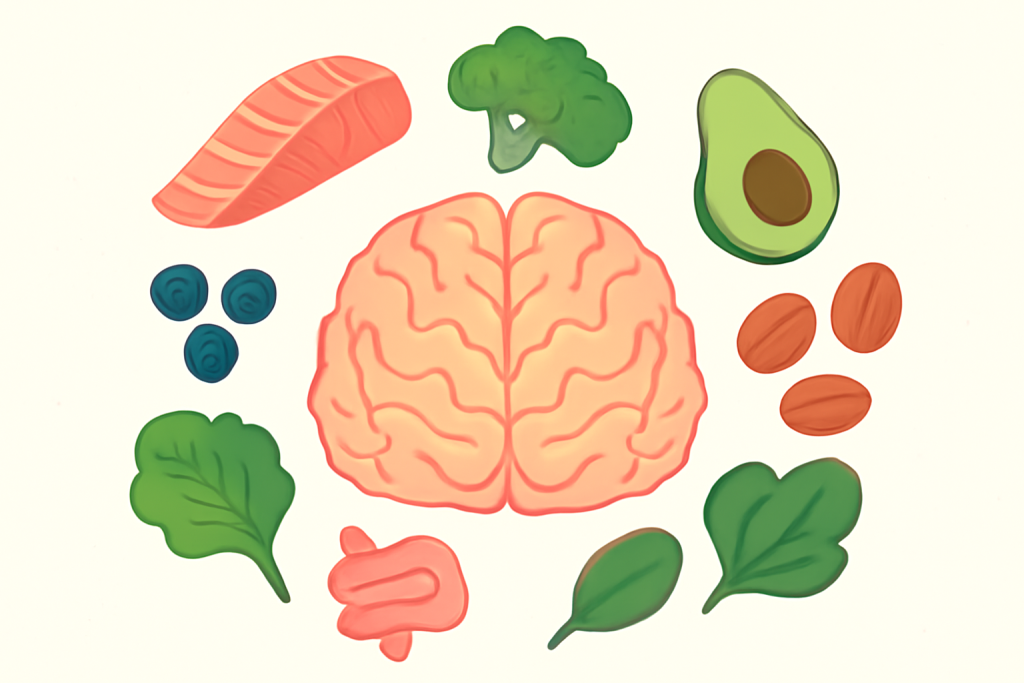Maintaining brain health has become a growing priority in recent years, as research uncovers the critical connection between what we eat and how well our brains function. Nutrition plays a central role in cognitive performance, memory retention, mood regulation, and long-term brain resilience against neurodegenerative diseases. This article explores the current understanding and emerging trends in the role of nutrition in brain health, providing practical guidance to support cognitive well-being through diet.

Understanding the Role of Nutrition in Brain Health
The brain is one of the most metabolically demanding organs in the body, requiring a steady supply of nutrients to function optimally. Nutrients influence brain cell communication, neuroplasticity, and protection against oxidative stress and inflammation—key factors affecting cognition and mental health.
Recent studies emphasize that a well-balanced diet rich in specific nutrients can:
- Enhance memory and learning abilities
- Reduce the risk of cognitive decline
- Support mental well-being and emotional stability
- Protect against neurological disorders such as Alzheimer’s and Parkinson’s disease
Key Nutrients That Support Brain Function
Certain nutrients are now recognized as particularly important for brain health. Including them regularly in the diet can support both short-term cognitive function and long-term brain resilience.
1. Omega-3 Fatty Acids
Omega-3 fatty acids, especially EPA and DHA, are crucial components of neuronal membranes and play a vital role in brain structure and function. Research shows that omega-3s help reduce inflammation in the brain and support synaptic plasticity, essential for memory and learning.
- Sources: Fatty fish (salmon, mackerel, sardines), flaxseeds, chia seeds, walnuts
- Evidence: A 2020 meta-analysis published in Nutrients found that omega-3 supplementation improved cognitive function in older adults with mild cognitive impairment (Godos et al., 2020).
2. Antioxidants
Oxidative stress contributes to neuronal damage and aging. Antioxidants help neutralize free radicals, reducing oxidative damage.
- Key antioxidants include vitamins C and E, flavonoids, and polyphenols.
- Sources: Berries, dark leafy greens, nuts, green tea, dark chocolate
- Evidence: Studies link higher dietary antioxidant intake with lower risk of cognitive decline (Devore et al., 2012).
3. B Vitamins
B vitamins such as B6, B12, and folate are essential for homocysteine metabolism, DNA repair, and neurotransmitter synthesis.
- Deficiencies in B vitamins are associated with impaired cognitive function and increased risk of dementia.
- Sources: Whole grains, legumes, eggs, dairy, leafy vegetables
- Evidence: The Framingham Heart Study demonstrated that higher plasma levels of B12 were linked to better cognitive performance (Morris et al., 2006).
4. Vitamin D
Vitamin D receptors are widespread in brain tissue, influencing neurodevelopment and neuroprotection.
- Low vitamin D levels are linked with cognitive impairment and mood disorders.
- Sources: Sunlight exposure, fortified foods, fatty fish
- Evidence: A review in Frontiers in Aging Neuroscience (2020) highlights vitamin D’s role in preventing cognitive decline (Annweiler et al., 2020).
5. Magnesium
Magnesium is vital for synaptic function and neuroplasticity.
- Magnesium deficiency has been associated with anxiety, depression, and cognitive dysfunction.
- Sources: Nuts, seeds, whole grains, green leafy vegetables
- Evidence: Clinical trials suggest magnesium supplementation can improve mood and cognitive symptoms (Barbagallo et al., 2011).
Emerging Trends in Nutrition and Brain Health
The Gut-Brain Axis and Nutrition
An emerging area of interest is the gut-brain axis—the communication network between the gastrointestinal tract and the brain. Gut microbiota influence brain function through immune, neural, and endocrine pathways.
- Prebiotic and probiotic foods (fermented products, fiber-rich fruits and vegetables) support healthy gut flora.
- A healthy microbiome is linked to reduced anxiety, improved mood, and cognitive health.
- A 2021 study in Nature Reviews Neuroscience describes how dietary modulation of gut bacteria affects brain function and mental health (Mayer et al., 2021).
Intermittent Fasting and Brain Health
Intermittent fasting (IF), involving cycles of fasting and eating, is gaining attention for its potential cognitive benefits.
- IF may promote autophagy (cellular cleanup), reduce inflammation, and improve mitochondrial function.
- Some studies indicate IF enhances memory and protects against neurodegeneration.
- However, more long-term clinical data is needed to confirm safety and efficacy (Longo & Mattson, 2014).
Personalized Nutrition for Cognitive Optimization
Advances in nutrigenomics allow tailoring diet plans based on individual genetic profiles to optimize brain health.
- This approach considers genetic variants influencing nutrient metabolism and cognitive risk.
- Personalized nutrition can target prevention and management of cognitive decline.
- Ongoing research is shaping this precision nutrition field.
Practical Tips to Improve Brain Health Through Nutrition
Incorporating brain-supportive foods into daily life does not require drastic dietary changes. Here are practical steps to follow:
- Eat a Mediterranean-style diet: Rich in fruits, vegetables, whole grains, legumes, nuts, and olive oil, this diet has strong evidence supporting brain health.
- Include fatty fish twice a week: To boost omega-3 intake.
- Prioritize colorful plant foods: For antioxidants and vitamins.
- Add fermented foods: Like yogurt, kefir, and sauerkraut to promote gut health.
- Limit processed foods and added sugars: These can increase inflammation and negatively impact cognition.
- Stay hydrated: Even mild dehydration can impair concentration and memory.
- Consult healthcare providers: Before starting supplements, especially B vitamins, vitamin D, or omega-3s.
Conclusion
The role of nutrition in brain health is more significant than ever recognized. Emerging research highlights how diet affects cognitive function, mental health, and brain resilience over time. By focusing on key nutrients, supporting gut health, and considering personalized approaches, individuals can take practical steps to nourish their brains effectively. Staying informed about these developments and applying evidence-based dietary strategies can contribute to maintaining cognitive vitality well into the future.
References
- Godos, J., et al. (2020). Effects of Omega-3 Fatty Acids Supplementation on Cognitive Function: A Systematic Review and Meta-Analysis. Nutrients, 12(7), 2107. https://doi.org/10.3390/nu12072107
- Devore, E. E., et al. (2012). Dietary Antioxidants and Long-Term Risk of Dementia. JAMA Neurology, 69(6), 666–673. https://doi.org/10.1001/jamaneurol.2013.2339
- Morris, M. S., et al. (2006). Folate and Vitamin B-12 Status in Relation to Cognitive Function and Decline in Older Adults. The American Journal of Clinical Nutrition, 84(5), 1139–1144. https://doi.org/10.1093/ajcn/84.5.1139
- Annweiler, C., et al. (2020). Vitamin D and Cognition in Older Adults: Updated International Recommendations. Frontiers in Aging Neuroscience, 12, 204. https://doi.org/10.3389/fnagi.2020.00204
- Barbagallo, M., et al. (2011). Magnesium and Aging. Current Pharmaceutical Design, 17(7), 832–839. https://doi.org/10.2174/138161211795656920
- Mayer, E. A., et al. (2021). Gut/brain axis and the microbiota. Nature Reviews Neuroscience, 22(6), 332-345. https://doi.org/10.1038/s41583-021-00456-9
- Longo, V. D., & Mattson, M. P. (2014). Fasting: Molecular Mechanisms and Clinical Applications. Cell Metabolism, 19(2), 181-192. https://doi.org/10.1016/j.cmet.2013.12.008






